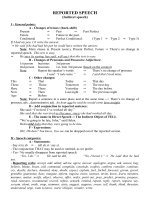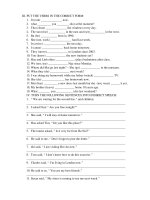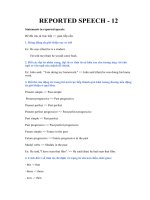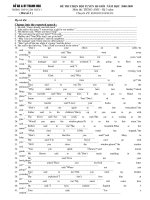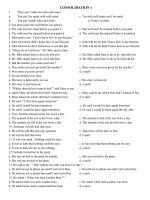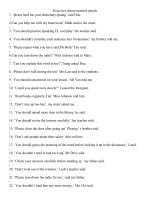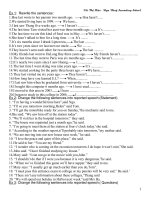Grammar reported speech
Bạn đang xem bản rút gọn của tài liệu. Xem và tải ngay bản đầy đủ của tài liệu tại đây (103.48 KB, 4 trang )
REPORTED SPEECH
Câu tường thuật (còn được gọi là câu gián tiếp) được dùng để thuật lại hay kể lại lời nói của 1
người nào đó.
Câu tường thuật có 2 mệnh đề : Mệnh đề chính (mệnh đề giới thiệu) và mệnh đề tường thuật.
Lan said, “ I’m a student.” (câu trực tiếp)
Lan said ( Mệnh đề chính) : “ I’m a student.” (mệnh đề tường thuật )
Lan said (that) she was a student. (câu tường thuật)
A. STATEMENTS ( tường thuật câu nói )
“said” được giữ lại, “said to” thường được thay bằng “told”
Đổi ngôi của các đại từ nhân xưng, tính từ sở hữu, đại từ sở hữu
Đổi các trạng từ chỉ thời gian và nơi chốn
Here → There
Now → Then
This → That
These → Those
Today
That day
Tomorrow
The day after, the following day
Yesterday
the day before, the previous day
Next week
The week after, the following week
Last week
The week before, the previous week
Ago
Before
Nếu động từ trong mệnh đề chính ở q khứ, thì động từ trong mệnh đề tường thuật phải được
đổi lùi về quá khứ một bậc.
Direct (trực tiếp)
Indirect (gián tiếp)
Simple Present
Simple Past
Present Continuous
Past Continuous
Present Perfect
Past Perfect
Simple Past
Past Perfect
Simple Future (will / shall)
Future in the Past (would)
He said, “I’m very tired.”
He said (that) he was very tired. (Present → Past)
She said, “ I’m watching TV now.”
She said (that) she was watching TV then. (Present Continuous → Past Continuous)
My friends said, “ We went to the circus last night.”
My friends told me that they had gone to the circus the previous night. (Past → Past Perfect)
The boy said, “I’ll have a test tomorrow.”
The boy said that he would have a test the following day. (Future → Future in the Past)
B. IMPERATIVE ( tường thuật câu mệnh lệnh )
Câu mệnh lệnh là câu bắt đầu bằng 1 động từ nguyên mẫu : go out / close the door / turn left …
Hay “Don’t + V” : don’t go out late / don’t work too hard …. (Phủ định)
1. Affirmative Imperative ( câu mệnh lệnh khẳng định )
Khi đổi câu mệnh lệnh khẳng định sang câu tường thuật ta tiến hành các bước sau đây:
Đổi “said” hay “said to” thành “told” hay “asked”.
Thêm tân ngữ (Object) vào sau động từ trong mệnh đề chính (nếu cần).
Bỏ từ “please” (nếu có)
Mệnh đề tường thuật bắt đầu bằng “ To - Infinitive”.
Đổi ngơi của các đại từ nhân xưng, tính từ sở hữu, đại từ sở hữu ...
Đổi các trạng từ chỉ thời gian và nơi chốn
My mother said to me, “ close the windows”
My mother told me to close the windows.
“Post this letter for me, please” said Ann’s brother.
Ann’s brother asked her to post that letter for him.
Lucy said, “remember to phone me, Andy”
Lucy told Andy to remember to phone her.
Lucy reminded Andy to phone her. (nếu dùng remind (nhắc nhở) ta không dùng remember)
2. Negative Imperative ( mệnh lệnh phủ định )
Khi đổi câu mệnh lệnh phủ định sang câu tường thuật ta cũng tiến hành các bước như đổi câu
mệnh lệnh khẳng định. Nhưng mệnh đề tường thuật bắt đầu bằng “ Not + To-Infinitive”
The boy’s mother said to him, “don’t go out late tonight”.
The boy’s mother told him not to go out late that night.
Her friends said, “don’t forget to lock the door.”
Her friends told her not to forget to lock the door.
Lan said to me, “don’t wait for me tomorrow”.
Lan told me not to wait for her the next day.
Reporting commands, requests, orders with Infinitive and Gerund : Tường thuật câu
mệnh
lệnh, yêu cầu …. dùng với To- Infinitive hoặc Gerund
Verb + to infinitive
Agree - claim (khẳng định) - demand (đòi hỏi) - decide - offer promise - refuse - threaten (đe dọa) - want = wish
Verb + object + to infinitive
advise - allow - ask - beg - command (= order) - encourage - forbid
(cấm) - invite - permit - recommend (đề nghị) - remind - request - tell
- urge - warn
Verb + gerund
admit - allow - deny - propose - recommend - regret - suggest
Verb + preposition + Gerund /
accuse sb of (buộc tội) - apologize (to sb) for - complain about -
Noun
confess to (thừa nhận) - congratulate sb on - inform sb about - insist
on (khăng khăng, nài nỉ) - object to (phản đối) - scold (sb) for (quở
trách) - thank sb for
“Remember to post this letter for me”
→ My brother reminded me to post that letter for him
“I wouldn’t eat too much if I were you, Dave” said Pasty.
→ Pasty advised Dave not to eat too much
“ We don’t take that book out of here”.
→ They denied taking that book out of there.
“ I'm really sorry for being so late, ” said Maria.
→ Maria apologized for being late
“OK, I'll give you a lift,” said Jenny.
→ Jenny agreed to give her a lift.
'Well done, Tina, you've passed the exam! ”
→ I congratulated Tina on passing her exam.
'I'll have the fish soup, please,” said Bill.
→ Bill decided to have the fish soup.
'Would you like to come to the cinema on Saturday, Pam? ”
→ I invited Pam to the cinema on Saturday.
'Shall I carry your case, Dawn? ”said Peter.
→ Peter offered to carry Dawn's case.
'I'll be home by eight, mom.” said Ann.
→ Ann promised to be home by eight.
'No, I won't open the door! ”said Carol.
→ Carol refused to open the door.
C. QUESTIONS ( tường thuật câu hỏi )
1. Wh - Questions
“said” hoặc “said to” được chuyển thành “asked”
Từ để hỏi “Wh-” được giữ lại
Trật tự câu hỏi được đổi thành câu kể ( = câu khẳng định)
Động từ trong mệnh đề tường thuật đổi lùi về quá khứ một bậc.
He said to me, “Who is Nguyen Du?”
He asked me who Nguyen Du was.
Ann asked, “Where did you go last night, Mike?”
Ann asked Mike where he had gone the previous night / the night before.
“When will you finish this report?” I asked.
I asked Paul when he would finish that report.
2. Yes - No Questions.
Các thay đổi cơ bản giống như phần Wh-Questions.
Thêm “If hoặc whether” vào sau mệnh đề chính
“Do you understand the lesson?” Asked our teacher.
Our teacher asked us if we understood the lesson.
She said, “Are there any apples in the fridge?”
She asked whether there were any apples in the fridge.
Subject Pronouns
(đại từ làm chủ từ)
S+V
I
You
He / she / it
We
You
They
Object Pronouns
(đại từ làm túc từ)
V+O
Me
You
Him / her / it
Us
You
Them
Possessive Adj
(tính từ sở hữu)
Possessive Adv
(đại từ sở hữu)
Reflexive Pronouns
(đại từ phản thân)
My
Your
His / her / its
Our
Your
Their
Mine
Yours
His / hers / its
Ours
Yours
Theirs
Myself
Yourself
Himself / herself / …
Ourselves
Yourselves
Themselves
CHÚ Ý
Các trường hợp thay đổi thì :
Khi động từ tường thuật (say, tell ask…) ở thì quá khứ, động từ trong câu gián tiếp phải lùi về quá khứ 1
thì.
Các trường hợp khơng thay đổi thì :
Khi động từ tường thuật (say, tell ask …) ở thì hiện tại, động từ trong câu gián tiếp không thay đổi về thì.
Khi động từ tường thuật (say, tell ask …) ở thì quá khứ, Động từ trong câu gián tiếp khơng thay đổi trong
các tình huống sau:
Tường thuật 1 sự thật hoặc 1 điều luôn luôn đúng
- My teacher said: “ Russia is the biggest country in the world.”
→ My teacher said that Russia is the biggest country in the world.
Khi động từ trong câu gián tiếp là các động từ hình thái (modal verbs) : could, would, should,
might, ought to, had to, used to
- He said: “ They might win the games.”
→ He said to me that they might win the games.
Khi động từ trong câu trực tiếp ở các thì : Past Continuous, Past perfect, Past Perfect Continuous
thậm chí động từ ở Simple Past đi kèm với 1 tg cụ thể thì cũng có thể được giữ nguyên.
- He sais : “the Tsunami happened in 2004”
→ He sais that the Tsunami happened / had happened in 2004.
Khi tường thuật câu mong ước (WISH), câu điều kiện loại 2, 3
-
“It’s (high) time” (đã đến lúc)
They said: “It’s time we went.
→ They said that it was time they went.
